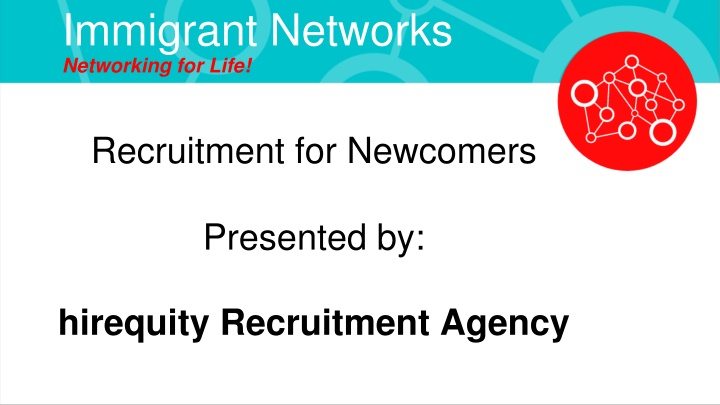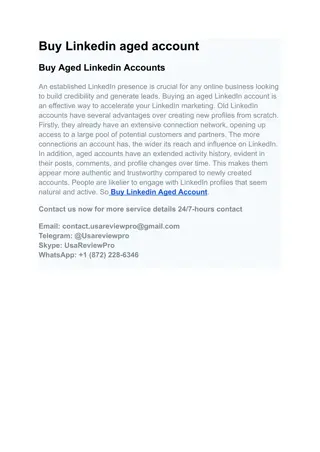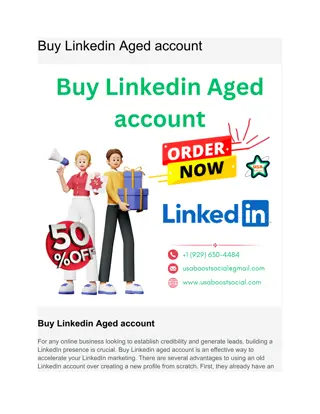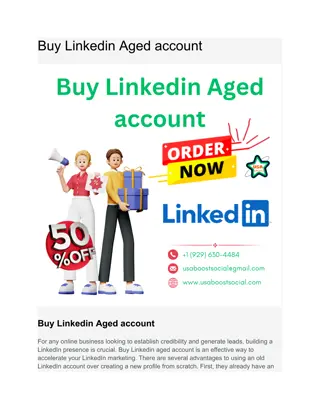Best Practices for Newcomers: Networking, Resumes, LinkedIn, Applications, and Interviews
This informative guide covers essential best practices for newcomers in the workforce, including networking strategies, resume dos and don'ts, LinkedIn etiquette, application tips, and interview etiquette. Learn how to navigate the recruitment process effectively and make a positive impression on potential employers.
Download Presentation

Please find below an Image/Link to download the presentation.
The content on the website is provided AS IS for your information and personal use only. It may not be sold, licensed, or shared on other websites without obtaining consent from the author.If you encounter any issues during the download, it is possible that the publisher has removed the file from their server.
You are allowed to download the files provided on this website for personal or commercial use, subject to the condition that they are used lawfully. All files are the property of their respective owners.
The content on the website is provided AS IS for your information and personal use only. It may not be sold, licensed, or shared on other websites without obtaining consent from the author.
E N D
Presentation Transcript
Immigrant Networks Networking for Life! Recruitment for Newcomers Presented by: hirequity Recruitment Agency
Best Practices The Do's and Don'ts of working with Recruitment Agencies
But First Recognition - For your efforts Belonging - In the workforce Appreciation - For your skills Change is Needed in Recruitment
Resume Do & Dont Resume - Do Start with a brief biography. What you are looking do to with your career. Reference the job in your email. Include specifics, metrics and data, achievements and awards or promotions. Keep your resume to 2 pages, check for grammar and proper formatting, include a portfolio (if you have it). Resume Don t Have a long list of your responsibilities and tasks that you were responsible for. It's boring to recruiters and hiring managers and doesn't explain why you are the best talent for the role. Include your picture or a cover a letter Be deceitful on your resume by sharing a different location than where you live, or misleading information on your titles, jobs or experience.
LinkedIn Do & Dont LinkedIn Don t Expect the Recruiter to respond immediately. Most recruiters will not connect back with you if they don't have a suitable role.. Stalk or repeatedly try to connect with the Recruiter. If they aren't responding, move on Send a connection request that says, "I need a job!" or worse, Hello. Hello Sir They won't respond. LinkedIn - Do Have a complete profile with photo, work experience, skills and recommendations. Connect directly with Recruiters that are in your field of expertise instead of Generalists. Customize the connection request with a brief bio and what help you are seeking.
Application Do & Dont Application - Don't Bother applying to something that the recruiter says you "MUST' have when you don't. Send an informal application instead. Go in depth with a long email about why you are the best for the role. Keep it brief with 2-3 points and your resume. Send the recruiter an application and then an email and then go on LinkedIn and then on social media just use one method. Application - Do Apply using the method the recruiter has asked for (website, email etc...) Share important details such as your experience as it directly relates to the role, or work authorization. Share documents or presentations that might shape the recruiters opinion.
Interview Do & Dont Interview - Don't Miss the appointment without letting them know. They likely will move on to the next candidate and not callback. Be upset or angry with the recruiter. They are acting on behalf of their client and their mandate. Sometimes they have flexibility, but often they do not. Try to bypass the recruiter and go directly to the brand or company. The recruiter won't work with you on that role and likely, won't work with you again. Interview - Do Show up in time and be prepared by having your resume with you to reference details about you. Research the company and the job description, if the recruiter has shared it with you. Be prepared to answer a few questions to see if you are a fit and if not, ask if they have anything else that is.
Recruiter - Do Ask them for feedback and take it - it will help you get the job! Make sure they are staying connected with you throughout the interview process - they want you to get the job! Communicate with them any concerns that you have. They can help to alleviate them.
Candidate Rights Work with a recruiter that is open, honest and listens to you. They should know the answers to your questions or be able to get them for you! The recruiter should be available to you and responsive and communicative. If not, ask them for what you need. Make sure that your recruiter is acting in your best interests too. Your work, pay, location and job preferences are important!
Review the Agreement Your recruiter is here to go through this with you in detail and get you the best deal.
Keep In Touch After you have started, your recruiter should touch base with you and you should stay connected.
Give Referrals Recruiters love referrals as they are always looking to expand their candidates and talent.










